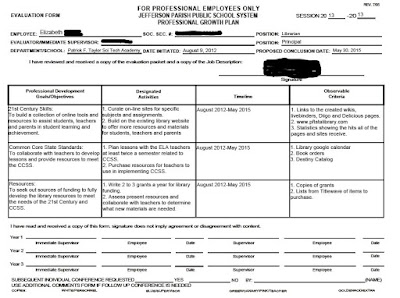Why the Louisiana Teacher Evaluation System is Flawed
For about four years, the state of Louisiana has been using a system called Compass for the annual teacher evaluations.It is composed of three parts. First, the teacher must write a professional growth plan and submit it. I have been writing one of these plans ever since I began teaching in the public school system, so that is nothing new. I always set some new goals for myself each school year anyway, and I really don't mind putting that down in writing. See below for an example.
 |
| My professional growth plan for 2012-2013 click the picture above to enlarge it |
The second part of the evaluation is the observation. I am suppose to conference with my principal about a lesson that I am going to be teaching, and then she observes it. The administrator must make two formal observations a year. I have always done very well on these observations. You know, I should have learned something about the best way to present material to students with 35 years of teaching under my belt. You can find the rubric here that the principal uses when she makes an observation of a librarian. The librarians have only been using this rubric for the last two years. When Compass launched, the librarians were observed with a checklist created for classroom teachers. That was totally ridiculous because it did not take into account all the things a librarian did besides teach. It was the members of the state school librarian organization, LASL, who took it upon themselves to create a rubric specific for librarians. Not all districts in Louisiana use the rubric, but mine does. I think that to promote professionalism of librarians across the state, LASL needs to work towards getting the rubric in place for everyone. That is why if you open the rubric link above, it is housed on the Jefferson Parish website, not the state department of education website. When the two observations are completed, you are given a score from 1 to 4 based on how well you hit all the points in the rubric. For the 2014-2015 year, my score was a 4, the highest. This score is subjective based on your evaluator's understanding of the librarian rubric as it differs from the one for the teachers. In some schools, the librarian is not always judged fairly.
I was certainly pleased with that 4; except, I still had to survive the completion of the third part of the evaluation which is the most arduous. It is solely dependent on how your students perform on a test. This part is called the SLTs or Student Learning Targets. SLTs are a measurable goal for student achievement over a given period of time. Most of the teachers use the standardized tests given by the district and the state to show achievement. There is no standardized testing program for the library. The librarians must create two tests of their own to give as a pre-test and post-test, and then with the baseline results from the pre-test, you create a goal demonstrating growth of the students.
It is a very time consuming process to create two tests for the two SLTs measuring students' understanding of research and information literacy skills. I decided that I would use the TRAILS program from Kent State University for my tests. TRAILS offers two different tests for grades 3, 6, 9 and 12. The tests are difficult. When you look at the benchmark data for 2014-15 in Louisiana for TRAILS, of the 2164 six graders tested, the median score was 49.7%. Of the 1104 9th graders tested, the median score was 47.9%. This test is hard!
After giving the 6th graders a pre-test, these were the results: 38% (or 21 of 56 students) in my class(es) passed the pre-assessment with a score of 67% or better. Not very good, but it gave them room to grow. The district provided me with the following SLT: 80% of students in the 6th grade ELA classes will achieve a score of 85% or higher on the post-assessment. Okay, maybe that is doable, but there were only 20 questions on the test. Eighty percent of the students had to miss three or less for me to meet the target. Not going to happen. It didn't. I got a 1, the poorest score. It was worse for the 9th graders because 90% of the students had to achieve a score of 95% or higher, and the students had to miss two or less for me to achieve my goals which I did not
Problems with the SLT program:
1. I was using a test that I did not design and was not created as an evaluation tool for librarians.
Though it is a well written test covering a wide breadth of information literacy skills, the amount of material in the test is so far reaching that I am unable to cover it in the amount of time that I have.
2. Unlike teachers who see their students daily, I had only a handful of face to face teaching lessons with the students that I tested.
3. If you look at the benchmark median scores at the state level which were below the 50th percentile and just a few percentile points higher at the national level, it is unrealistic for a majority of my students to reach an 85% or a 95%.
It was decided at the state level that the two scores including the observation and the SLTs would be averaged together to create the teacher's overall score with one exception. If a teacher scored a 1 on either section, the teacher would receive a 1 on their evaluation thereby branding them as ineffective.
Ineffective!!!!! I work very hard for my students and my teachers. I have won several awards at the national and state level. In my district of 70 librarians, I am one of the ones who is called on to assist others. I have made many presentations to educators across the state including the keynote speech for 300 librarians on the LAMP tour in 2011. I am not trying to brag about my accomplishments. I have had many and ineffective is not one of them.
Now my ineffective is part of the statistics for my school and my district. I just don't believe that is fair considering all that I do. In July, I was able to go to the district with a grievance to have my SLTs amended. My case was denied.
Why have I written this post? I am not proud of what happened, but I don't believe that it is a reflection of what I do day in and day out as an educator. The general population needs to realize that not all statistics paint an accurate picture of what is happening in our schools. Tests are not the answer.
To me, it is the students who come back after graduation and tell me that what I did for them helped prepare them for college, and that research was a breeze because of the assistance and guidance that I gave to them. I know that I am providing what my students need for future readiness. Now I wish the state of Louisiana did, too.



Comments
Post a Comment